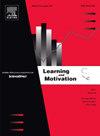The role of AI tools on EFL students’ motivation, self-efficacy, and anxiety: Through the lens of control-value theory
IF 1.7
4区 心理学
Q3 PSYCHOLOGY, BIOLOGICAL
引用次数: 0
Abstract
Incorporating Artificial Intelligence (AI) into education has unveiled changing opportunities, especially for English as a Foreign Language (EFL) learners. Moreover, promoting learner motivation and self-efficacy and minimizing learners' anxiety regarding AI-based education is vital for achieving effective learning results. This study delved into how AI tools affect EFL learners’ motivation, anxiety, and self-efficacy. A total of 168 university learners in two classes participated in this research, 82 were assigned to the experimental group and 86 were assigned to the control group. The cases utilized the AI tool, namely Duolingo, whereas the controls received conventional language teaching. Three scales were used as post-tests and pre-tests. Using One-way Analysis of Covariance (ANCOVA), findings revealed significant improvements in motivation, self-efficacy, and anxiety reduction among the experimental group, while the control group exhibited only minor changes. These results highlight the effectiveness of AI-based language learning in fostering engagement and emotional resilience. This is consistent with the Control-Value Theory (CVT), suggesting that a greater sense of perceived control results in positive educational emotions, resulting in lower anxiety while increasing self-efficacy and motivation. The present research adds to the growing research on AI in language teaching, providing information on the effective integration of AI tools to optimize learner learning, boost motivation, and promote emotional resilience within EFL settings.
人工智能工具对英语学生动机、自我效能感和焦虑的作用:基于控制价值理论的视角
人工智能(AI)与教育的结合带来了变化的机会,尤其是对英语学习者来说。此外,提高学习者的学习动机和自我效能感,减少学习者对人工智能教育的焦虑,对于获得有效的学习效果至关重要。本研究探讨了人工智能工具如何影响英语学习者的动机、焦虑和自我效能感。本研究共选取两个班168名大学生作为研究对象,其中82人为实验组,86人为对照组。这些案例使用人工智能工具,即Duolingo,而对照组则接受传统的语言教学。三个量表分别用作后测和前测。使用单向协方差分析(ANCOVA),结果显示实验组在动机、自我效能和焦虑减少方面有显著改善,而对照组仅表现出微小的变化。这些结果强调了基于人工智能的语言学习在培养参与度和情绪弹性方面的有效性。这与控制价值理论(CVT)是一致的,表明更强的控制感会产生积极的教育情绪,从而降低焦虑,同时增加自我效能和动机。目前的研究增加了人工智能在语言教学中的研究,提供了有效整合人工智能工具的信息,以优化学习者的学习,提高动机,并促进EFL环境下的情绪弹性。
本文章由计算机程序翻译,如有差异,请以英文原文为准。
求助全文
约1分钟内获得全文
求助全文
来源期刊

Learning and Motivation
Multiple-
CiteScore
2.90
自引率
0.00%
发文量
53
期刊介绍:
Learning and Motivation features original experimental research devoted to the analysis of basic phenomena and mechanisms of learning, memory, and motivation. These studies, involving either animal or human subjects, examine behavioral, biological, and evolutionary influences on the learning and motivation processes, and often report on an integrated series of experiments that advance knowledge in this field. Theoretical papers and shorter reports are also considered.
 求助内容:
求助内容: 应助结果提醒方式:
应助结果提醒方式:


